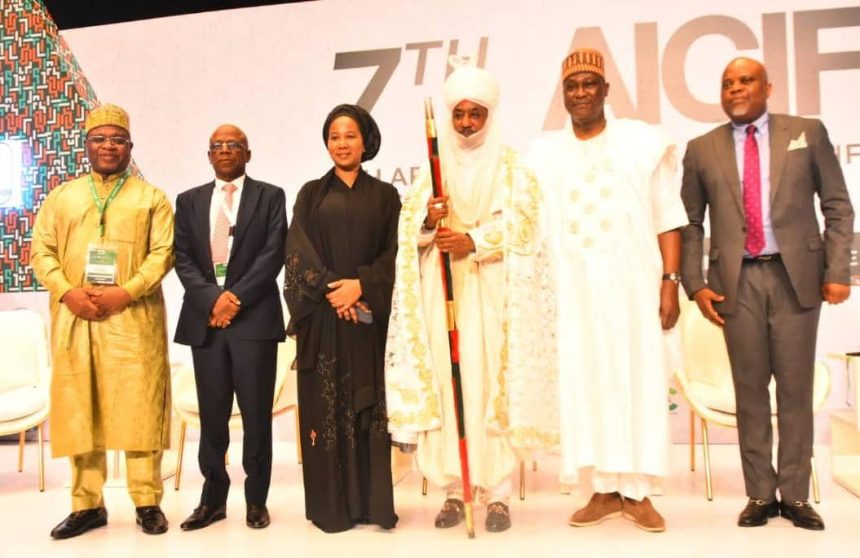VP Shettima Calls on Africa to Deepen Adoption of Islamic Finance for Prosperity
By Patience Ikpeme
Vice President Kashim Shettima, alongside other key economic stakeholders, has made a resounding call for African nations to significantly increase their adoption of Islamic finance as a strategic tool for driving inclusive and sustainable economic transformation across the continent.
Represented by Dr. Tope Fasua, Special Adviser to the President on Economic Matters, Vice President Shettima made the call while addressing delegates at the 7th African International Conference on Islamic Finance (AICIF) in Lagos on Tuesday. The event was organised by Metropolitan Law and Metropolitan Skills Ltd in collaboration with the Securities and Exchange Commission of Nigeria (SEC).
Speaking on the theme, “Africa Emerging: A Prosperous and Inclusive Outlook,” the Vice President stated that Africa’s demographic strength must be converted into equitable prosperity, asserting that the continent’s progress will be measured not only by growth figures but by genuine inclusion. He connected this vision to Nigeria’s recent economic reforms under President Bola Tinubu’s Renewed Hope Agenda, describing them as key drivers of stability and investor confidence.
According to Shettima, Nigeria has taken bold steps, including unifying its exchange rate, rationalising subsidies, modernising tax and customs systems, and opening new gateways for trade and investment. These reforms, he said, have lifted reserves above $40 billion and earned favourable ratings from global agencies like Fitch and Moody’s.
“These outcomes affirm Nigeria’s position as an anchor of the AfCFTA’s $3.4 trillion market and a driver of Africa’s growth,” he said.
The Vice President made clear that Islamic finance offers a credible framework for promoting shared prosperity because it is rooted in principles of ethics, fairness, and social responsibility.
Vice President Shettima cited Nigeria’s experience to demonstrate the transformative potential of Islamic finance instruments such as sukuk (Islamic bonds), takaful (Islamic insurance), murabaha, and waqf (endowments), which have financed critical infrastructure and expanded access to inclusive financial services.
“Our sukuk issuances, now in their seventh cycle, have funded more than 120 major road projects covering nearly 6,000 kilometres,” Shettima noted. “Each bond represents a covenant between government and citizens, proof that finance can build rather than burden.”
He added that takaful insurance is extending essential protection to millions of households previously excluded from the conventional market, while waqf endowments are being explored to support schools, hospitals, and small businesses.
“Islamic finance aligns with our conviction that enterprise must serve humanity and wealth must circulate to uplift communities,” the Vice President stated.
He observed that across Africa, countries like Egypt, Senegal, Kenya, and South Africa are also developing regulatory frameworks for Islamic banking, green sukuk, and socially responsible investments. He projected that the share of Islamic finance in Africa’s capital markets is expected to expand significantly by 2030, urging policymakers to sustain reforms that strengthen transparency, governance, and investor protection.
The Vice President stressed the need to mobilise Africa’s vast domestic capital—including pension funds, sovereign wealth funds, and insurance pools—through innovative instruments such as green sukuk and diaspora bonds.
“Africa’s future must be financed from within, guided by principles of justice, inclusion, and sustainability,” Shettima asserted.
He concluded by urging participants to “build an Africa where enterprise and empathy coexist, where finance is not a privilege for the few but a promise to the many, and where every child, from Lagos to Lusaka, finds a stake in the continent’s future.”
Earlier, Conference Chairperson Ms. Ummahani Ahmad Amin said AICIF was conceived as a platform for collaboration to advance Islamic finance as a viable alternative source of funding for Africa’s socio-economic needs. She pointed out that while global Islamic finance assets reached $3.88 trillion in 2024, Africa still lags behind in harnessing its potential to close the continent’s annual infrastructure financing gap of up to $170 billion.
In his remarks, the Emir of Kano and former Governor of the Central Bank of Nigeria (CBN), Alhaji Sanusi Lamido Sanusi, called on Islamic finance institutions across Africa to focus more on supporting small and medium enterprises (SMEs) in underserved communities as a pathway to achieving shared prosperity.
Sanusi maintained that Islamic finance can only make a meaningful impact when it directly addresses the financial exclusion faced by small businesses and vulnerable groups.
“I would be happier to see Islamic banks that are big, but more importantly, ambitious enough to grow a market that delivers real value to people and helps reduce poverty,” Sanusi stated. “We need to begin now to see how we can use finance to create opportunities for the small people.”
He urged institutions to extend services to the grassroots, calling for bold strategies that bridge cultural and social barriers that have historically hindered access to finance, particularly for women. “Go to the grassroots, have the courage to build and connect with the cultural conceptions and attitudes that have denied women. The empowerment of women is what will contribute to prosperity in Africa,” he added.
The SEC Chairman, Mr. Mairiga Katuka, also noted that Nigeria’s non-interest capital market had grown rapidly under the Capital Market Masterplan, with sovereign sukuk raising over ₦1.4 trillion and funding 124 critical road projects nationwide.




